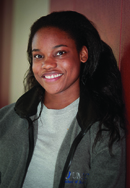Bodies of Knowledge: GROSS ANATOMY

Before I actually removed the sheet, I was hoping he would be old.
As odd as it sounds, I couldn't accept the idea of encountering a cadaver that appeared too young. Maybe it would be too hard to separate myself from the tasks ahead, or I hoped that he had lived long enough to experience everything life had to offer - good or bad.
Then I was hoping I wouldn't pass out from either the aroma or the sights.
Prior to lab, I had not seen a body. Even at a funeral I attended I avoided getting too close. I was scared for different reasons. I didn't want to start crying, in spite of the fact I never actually knew the man, and I didn't know how my body would react.
I didn't want to see someone that looked familiar. Not necessarily someone I knew, but someone I could imagine myself being friends with in church or a teacher from my favorite class in high school.
That type of familiarity can be challenging to get past considering what had to be done to complete the work for Gross Anatomy.
Once the sheet was removed, I thought, "This guy looks like he's sleeping in spite of the pallor and coldness of his skin."
He looked like he was a stern man; maybe he had a soft spot for those he cared for, but did not deviate from the strong line of his lips or the downward turn of his eyebrows.
For the first cut, I wanted to be as delicate as possible. I kept thinking how I didn't want to hurt him, in spite of the fact he couldn't feel anything.
On my first observation, I immediately noticed his tattoos. They were both names. I felt that seeing those tattoos made him a "softie," because I always thought those bold enough to put someone's name on their body takes so much dedication.
When my group had to remove those areas for the sake of the dissection, it made me feel as if we were violating something sacred.
He had people in his life that literally went everywhere he went. For those names to be so quickly removed with a scalpel blade, I felt that we had stripped him of his earthly connections.
This act solidified how we were/are turning this man into someone unrecognizable.
It was unusual, purposely cutting someone so deeply, even though it was for the sake of knowledge.
Separating myself from the person only came once distinguishing characteristics were removed. Things like the tattoos, bruises, hair and skin are gone and what is left is precisely what I see in my Gross Anatomy book and atlas.
I can now think of the cadaver as a 3-D study aid and no longer as an individual. I can hold the muscles, arteries and nerves without seeing the man with the names tattooed on his body.
Once I leave the lab for the day I begin to focus less on the person and more about learning about what I had seen. The lists for learning the anatomy get so long I feel less of the human connection. It is my brain's way of acknowledging that he donated his body for the sake of students' learning.
The thing that never leaves me is the smell. That distinct smell leaves its mark not only on the scrubs and lab coat. I have to be meticulous in terms of cleaning, otherwise it can get stuck in everything from my car seats to my hair. When I visit my mother, it doesn't take long before she turns her nose up while stating, "You've been in that lab!"
My experience in Gross Anatomy serves as a reminder of how fleeting life can be. I thought back to how I was talking to people about wanting to go to medical school while I was in junior high.
It's hard to believe that was over 10 years ago and I'm quickly approaching the halfway mark of my first semester of medical school.


